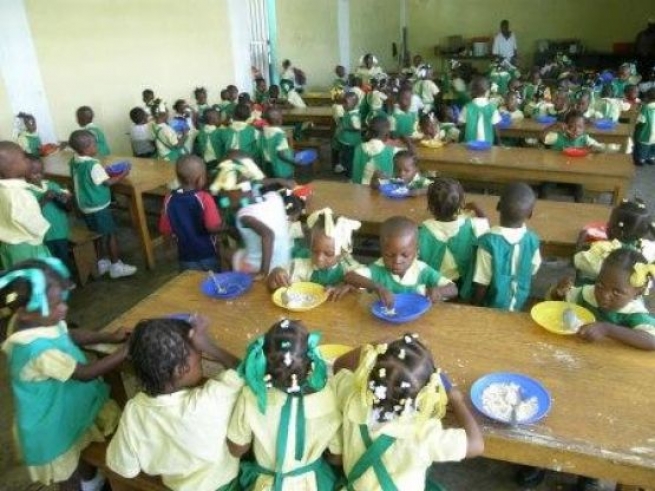The project is providing a cost share for the shipment of 16 containers of meals, eight from Breedlove, a non-profit organization dedicated to helping eradicate world hunger, and eight containers from Rise Against Hunger, an international relief organization that provides food and life-saving aid to the world’s most vulnerable people. The meals, which are provided five days a week for the 10-month duration of the project, will be shared among Salesian centers in the cities of Port-au-Prince, Fort-Liberté, Cap-Haïtien, Les Cayes, Gressier and Gonaïves. As a result, 12,733 Salesian students will access a hot meal each day at school.
The project also helped to ensure each of the six centers had kitchens equipped to cook the rice-meals and trained 15 school cooks to prepare the nutritional meals for students.
“Salesian missionaries strive to reach the poorest students who would otherwise not have the opportunity to receive an education. Many of the students come from families where food is not readily available and a large percentage of these students come to class on an empty stomach,” says Jessica O’Connor, senior international development officer at Salesian Missions. “The project has already had a great impact on students. Children who once arrived at school hungry and had to struggle through classes without food are now provided with a meal during the day, and as a result, students have shown improvements in health, happiness and capacity to learn.”
In Cap-Haïtien, the Primary School of the Vincent Foundation and the Lakay Program for Street Children are both beneficiaries of this project. Students attending the agricultural school at the Vincent Foundation were about to give up classes because of how challenging it is to focus on studies on an empty stomach. Because of this project, students were able to take advantage of the school’s feeding program. For many students, the Hunger for Education project made the difference between staying in school and dropping out.
The Hunger for Education project also serves as an incentive for children living on the street to seek out one of the Salesian programs for street children, where they receive hot meals in exchange for education and job-skills training. Salesian schools provide opportunities for remedial education and tutoring through their youth centers and programs for street children. However, no matter how many hours a child may spend sitting in a classroom, it is hard to focus and retain any information if the child is hungry. Additionally, some parents in Haiti will only allow their children to attend school if a meal is provided because otherwise the child is needed at home to work and provide for the family.
At the Salesian Center Cardinal Keeler Gonaïves and the Salesian primary and secondary schools in Gressier, more students are attending school regularly because of the feeding program. Many previously missed classes or were not engaged during class because they were hungry and could not concentrate. Now with a rice-meal for lunch each day, more children are showing up for school and are better engaged in the classroom.
Haiti is the poorest country in the Americas ranking 163 out of 188 countries on the United Nations Human Development Index. The country also faces the highest levels of severe food insecurity in the world, according to the World Food Programme. More than half of the country’s population was chronically undernourished during 2012-2014, representing a total of 5.3 million Haitians. Nearly 100,000 Haitian children under the age of 5 suffer from acute malnutrition.

